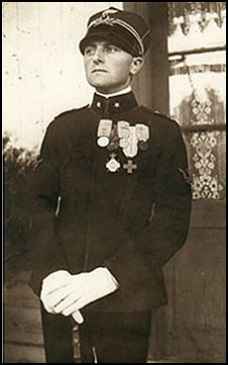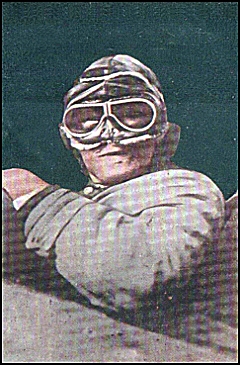

1896-1966 |
 |
 |
Collection of Georg v. Rauch Courtesy of Arne L. Brunner, |
from the Postcard Collection of Roberto Landi, 6-2-09 may be available for purchase |
|
This brief passage recreates the life of the aviator Eduardo Olivero, since his early
achievements as an aviation ace during WWI, when he bravely fought for Italy as an Argentine volunteer; to his
fearless passage, the flight Buenos Aires - New York, the first one of its kind. Eduardo Olivero was born in Tandil, Buenos Aires, Argentina, son of Italian inmigrants. As an adolescent, he escaped from his home to take flight lessons in the Flight School of Villa Lugano, a well-known institution for beign the centre used by experienced and famous aviators for their practices, among whom was Jorge Newbery. Before turning 18 years old, he highlights as an aviator. First World War explodes: his father and uncle are resolved to go to fight for their native Italy. Eduardo absolves them from their responsibility: he will go to fight on behalf of the Olivero family, to fight for his parent's Nation. Without even saying goodbye to his mother, with the help of his uncle, he sets out, audacious and resolved towards fighting in the WWI. As soon as he arrives, he is offered a place in the Italian Aviation Force but only by accepting the Italian nationality. Olivero declines their offer: argentine nationality is not negotiable; and he is incorporated as a soldier. Nevertheless, the urgent need for aviators forces de Italian Aviation Force to accept him, first as a flight instructor and then, as he requested it, as part of the Italian Aces Squadron. Eduardo participates bravely in many air combats, combats that will make him worthy of many medals. Once, he was flying solo taking photograps of enemy camp but is attacked by seven of them. He manages to shoot two down and escape, using all the fuel in the tank. He makes an emergency landing on a farm, is able to get more fuel and returns to the Italian base, where he had been presumed dead. Due to this episode, the King of Serbia gives him a medal. Once concluded the WWI, and with Gabriel DŽAnunzio's help, he is allowed to return to his country, Argentina, and reunite with his family. Olivero received the following medals and awards: three Silver Medals, two Bronze Medals, the Italian War Cross, the French Croix de Guerre with Palm, Italian Military Medal, War Volunteer Military Medal, Medal of the Italian Unity, and the Great Golden Cross of Karageorgevich (Knght of the Order of the King of Serbia). Now in Argentina, he gives flight lessons and breaks several altitude, speed, and distance records. In one occasion, while doing a stunt, his plane caught on fire, and, so as to avoid the flames burning his friend and copilot, he jumps over the fire, burning his own hands and face. Despite the pain and injuries, he is able to land without further problems. This event will change his appearance, but will not diminish his spirit and he will continue flying. In 1926, together with his student Bernardo Duggan and the Italian mechanic Campanini, they unite, for the first time, the cities of Buenos Aires and New York. He baptizes his Italian Savoia Marqueti with the name of "Rutilante de Buenos Aires" ("Buenos Aires brilliant"). This fantastic flight is followed worldwide. On their way back to Buenos Aires, they are pressumed dead for seven days, after a curious misadventure: while in the Brasilian coast, the enter, by mistake, in the Amazones, but manage to survive, living for this short period with the local, and amazed, Indians and registering this experience with photographs. Thanks to the aid of an embarkation, they are able to load more fuel and continue to Buenos Aires, where well renowned musicians and artists of the time compose allusive melodies and lyrics to this flight. An immense crowd is waiting for them at Buenos Aires, including the President, Marcelo T. de Alvear. His life remains intimately bound to aviation till his death. He attempts to be the first aviator to fly up to the stratosphere, but the beginning of WWII sets in. Finally, the brave Olivero passes in 1969. Translation courtesy of Gonzalo Ferrari Nicolay |


|